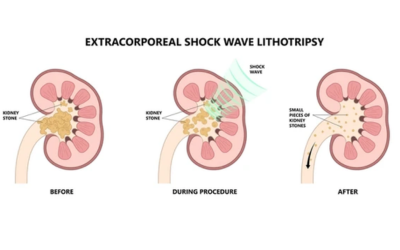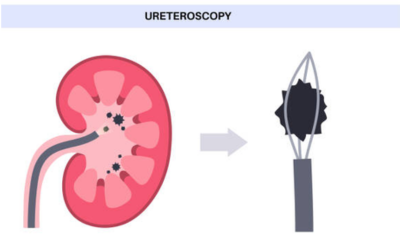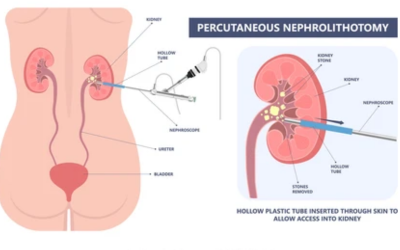
Kidney Stone Treatment in Nellore
Kidney stones can cause significant discomfort and pain, impacting your daily life. They form when certain minerals in your urine crystallize, resulting in hard deposits in the kidneys. Symptoms such as
severe back or abdominal pain,
If you’ve been struggling with kidney stones, it is essential to find the right kidney stone treatment in Nellore that addresses both the current issue and prevents future occurrences.

Dr. Nischal Prasad Reddy, an esteemed urologist in Nellore, emphasizes, “Kidney stones can often be treated without surgery, especially if diagnosed early. It’s crucial to seek treatment before symptoms worsen.”
At AR Kidney Hospital, Dr. Nischal Reddy, with his team of skilled urologists and nephrologists, offers advanced kidney stone treatment in Nellore, ensuring patients receive personalized care for optimal recovery. With over 18 years of specialized experience in treating renal and urological conditions, Dr. Reddy’s expertise includes non-invasive and minimally invasive procedures.
Are you worried about the risks of kidney stones? Let’s dive into why these tiny formations are a big concern.
Why are Kidney Stones a Concern?
Kidney stones are hard deposits of minerals and salts that form in the kidneys. While small stones may pass unnoticed, larger ones can cause intense pain and require medical intervention. This pain usually occurs when a stone is stuck in the urinary tract and trying to pass through the system.
If not treated on time, these stones can block the urinary tract, potentially leading to infections or irreversible damage.
Dr. Nischal Reddy states, “Early diagnosis is essential to prevent future episodes and maintain kidney health. Prompt treatment helps avoid complications and supports optimal kidney function.”

Are you dealing with kidney stones? Consult an experienced specialist for tailored treatment options. Book an appointment today.
Diagnosis of Kidney Stones
Medical History: A urologist will first review the patient’s symptoms and medical history to assess risk factors for kidney stones.
Physical Examination: A thorough examination to identify pain or discomfort that might indicate kidney stones.
Urine Test: A urine analysis detects crystals, blood, or infections that may point to stones.
Blood Test: Blood tests help check for high levels of minerals that form kidney stones, like calcium and uric acid.
Imaging Tests: Experts recommend ultrasounds, CT scans, or X-rays to detect the size and location of kidney stones.

Stone Analysis: If stones are passed, they are analyzed to determine their type, helping guide future prevention.
Treatment Options

Non-invasive treatments
Shock wave lithotripsy (SWL) is a preferred option for kidney stone treatment without surgery. This method uses high-energy sound waves to break kidney stones into smaller fragments, making them easier to pass through urine. Experts often perform these procedures for smaller stones located in the kidney or upper ureter.

Minimally invasive procedures
Less-invasive kidney stone treatments often include ureteroscopy and laser lithotripsy. In ureteroscopy, the surgeon inserts a thin tube (ureteroscope) through the urethra and bladder to access the ureter or kidney. They can remove the stones using a small tool or break them up with a laser. Laser lithotripsy may be used to break larger stones into smaller fragments, which can be removed or passed naturally.

Surgical treatments
If stones are too large or complicated for less invasive methods, percutaneous nephrolithotomy (PCNL) may be necessary. In this kidney stone removal surgery, the surgeon creates a small incision in the back and removes the stones using a scope.

Pain management
After treatment, pain management is essential. Specialists provide medications and guidelines to manage discomfort and ensure a smooth recovery. Follow-up appointments are crucial to monitor progress and prevent complications.
Seeking safe and effective kidney stone treatment? Reach out to a professional to discuss the best solution for your condition. Schedule a consultation now!
What Post-Treatment Care Does AR Kidney Hospital?
Medications
Our expert prescribes medications to manage pain, prevent infection, or reduce stone-forming substances in the body if needed.
Patients receive detailed instructions on maintaining proper hydration to prevent future kidney stones. Increased fluid intake helps flush out any remaining stone fragments.

The specialist provides personalized diet plans, focusing on reducing the intake of foods high in oxalate, calcium, or sodium, which can contribute to stone formation.

Lifestyle Modifications
Patients are advised to make long-term changes, such as adopting a healthy diet and staying active, to minimize the risk of stone recurrence.

Regular follow-ups are scheduled to monitor recovery, check for any new stone formation, and ensure the kidneys function properly.
Why Choose Us for Your Kidney Stone Treatment in Nellore?

Experienced Professionals
AR Kidney Hospital features a dedicated team of specialists, including experienced urologists and nephrologists in Nellore. Their expertise ensures comprehensive care tailored to each patient.

State-of-the-Art Technology
The hospital has cutting-edge facilities and technologies, ensuring safe and effective treatment options for kidney stones.

Personalized Treatment Plans
Each patient receives individualized care based on the size, type, and location of their kidney stones, ensuring the most suitable treatment option for a faster recovery.

Comprehensive Care
AR Kidney Hospital offers a full spectrum of services, from diagnosis to advanced treatments, ensuring every aspect of kidney stone care is covered under one roof.

Patient-Centred Approach
We focus on patient comfort and safety, offering compassionate care and clear communication throughout the treatment.

Our experts provide thorough post-treatment care, including diet recommendations, lifestyle advice and follow-up visits to prevent stone recurrence.
Testimonials
“I had severe pain from kidney stones, and Dr. Nischal Reddy recommended shock wave lithotripsy. The procedure was quick, and I felt minimal discomfort. Thanks to AR Kidney Hospital, I passed the stone naturally without surgery. I’m pain-free now!”
“My kidney stone was too large for non-invasive treatment, so Dr. Nischal Reddy suggested surgery. The team made me feel comfortable throughout the process, and the surgery went well. I’m grateful for their expertise and care.”
“After suffering from recurring kidney stones, Dr. Reddy performed a kidney stone removal surgery at AR Kidney Hospital. His professionalism and the hospital’s advanced facilities made my experience stress-free. I haven’t had any issues since the surgery!”
Got more questions about kidney stones? Let’s address some common queries.
Frequently Asked Questions
Can kidney stones be prevented?
Kidney stones can often be prevented by:
- maintaining proper hydration
- following a balanced diet low in salt and oxalates
- managing underlying health conditions
What is the recovery time after kidney stone treatment?
Are there any risks or complications associated with treatment?
Can kidney stones recur?
What are the symptoms of kidney stones that I should be aware of?
What insurance plans are accepted at AR Kidney Hospital for kidney stone treatment?
How can I schedule an appointment for kidney stone treatment in Nellore at AR Kidney Hospital?
Disclaimer: This page is for informational purposes and not for promotional use.
